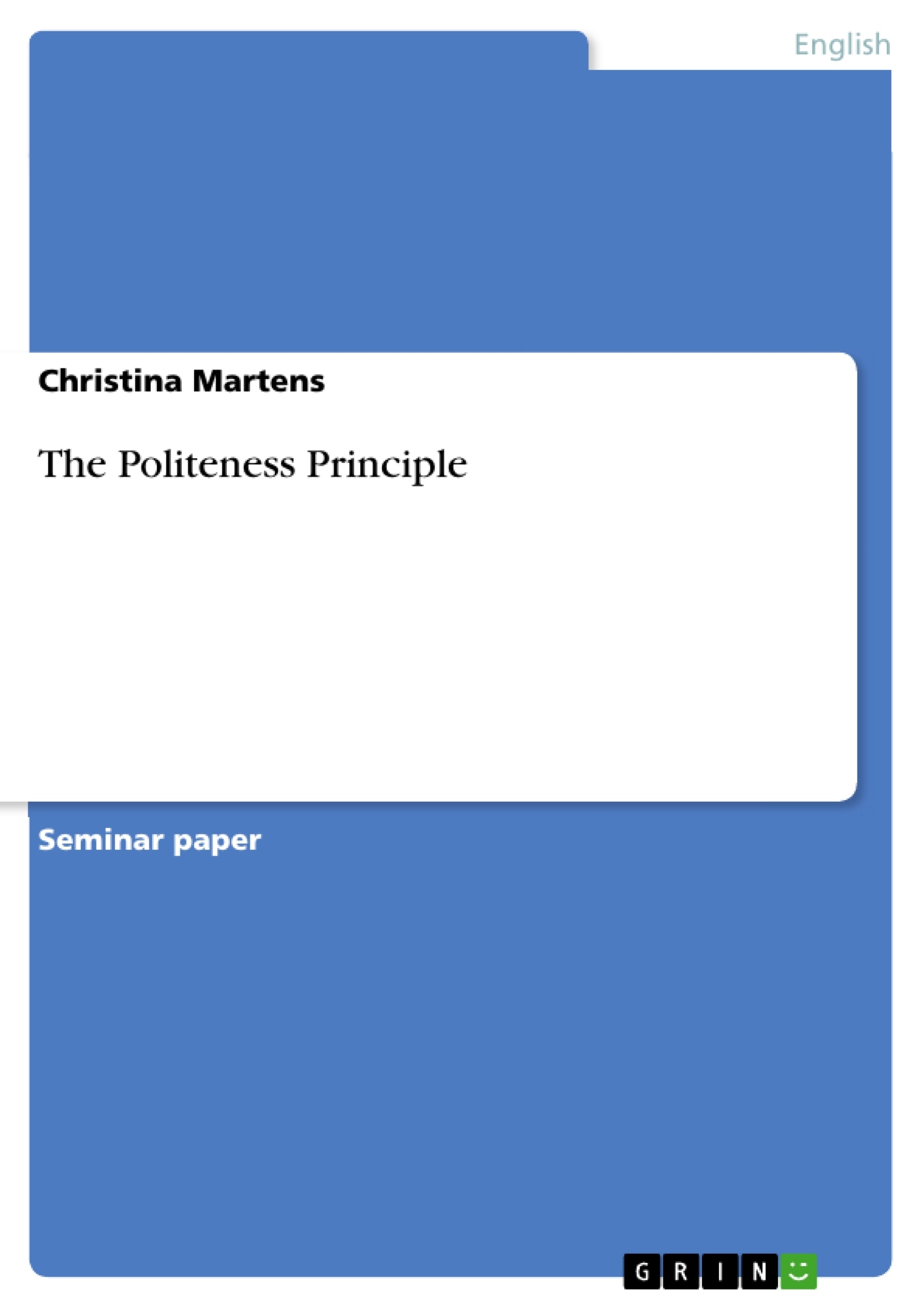Leseprobe
Inhalt
1. Overview of the Politeness Principle
2. Theories of the Politeness Principle
2.1 Delimiting the politeness concept
2.1.1 Deference and politeness
2.1.2 Politeness as an utterance level phenomenon
2.1.3 Register
2.1.4 Politeness as a pragmatic phenomenon
2.2 The maxims of the politeness principle
2.2.1 The Tact maxim
2.2.2 The Generosity Maxim
2.2.3 The Approbation Maxim
2.2.4 The Modesty Maxim
2.2.5 The Agreement Maxim
3. Practical part
3.1 Dialogue
3.2 Describing some maxims and theories on examples
4. The necessity of the Politeness Principle
5. Bibliography
1. Overview of the Politeness Principle
In everyday situations we have to communicate with other people to get information, to gain knowledge about a topic or to reach a variety of goals. To be successful, one has to follow some important strategies. Beside the rule of the language philosopher H.P. Grice, which is called the Cooperative Principle, there exists another concept that served when people are talking. It is called the Politeness Principle which has above all been developed by Leech. In the centre of this concept does not stand the information of a conversation, but the effect of what is said on the people.
2. Theories of the Politeness Principle
Referring to Searle`s categories of illocutionary acts, Leech points out a subdivision into negative and positive politeness. The negative politeness belongs eminently to the directive group, while positive politeness is dominant in the commissive and expressive group.[1] He introduces the term “impositives”, too. Among those groups there are existing a variety of theories and maxims which I like to deal with in the following essay.
2.1. Delimiting the politeness concept
2.1.1 Deference and politeness
Before giving an outline it may be necessary to delimit the concept of politeness first to be not confused. In general Politeness is understood as the desire to be pleasant to fellow men. It is often wrongly connected with deference, although deference is a distinct phenomenon. It is the opposite of familiar relations. If one is polite, consideration and affection are shown, whereas deference refers to the respect that is given to other people (for example: of greater age or higher status). This is signalled by the form, the hearer is addressed and that is why the relationship between hearer and speaker plays an important role. Both theories have something in common. They appear through the linguistic means and the general social behaviour of a human being. The base of their usage are sociolinguistic norms, but they are not dependent from each other. (It is for instance possible to be deferential without being polite.)
2.1.2 Politeness as an utterance level phenomenon
Another fact that has been connected with Politeness is utterance. Generally it was found out: “…the more grammatically complex or elaborate the strategy, the more highly it was rated for politeness.”[2]
illustration not visible in this excerpt
The example presents different possibilities of expressing one ask. It develops from a polite request (1) to an order (3).
The first relevant issue in this case is the context, because the hearer can just make sense out of the words when he knows the required context and the speaker may achieve his goal.
Having further a look at the speech act in context and finding out which function a particular form in a language has to reach the speaker`s goal, it becomes obvious that there is no necessary connection between the perceived politeness of a speech act and the linguistic form. Therefore, there are existing several reasons like the relationship etc.
[...]
[1] George Leech. Principles of Pragmatics. (London & New York: Longman, 1997) 107
[2] Jenny Thomas,Meaning in Interaction (London & New York: Longman, 1997) 155.
- Arbeit zitieren
- Christina Martens (Autor:in), 2001, The Politeness Principle, München, GRIN Verlag, https://www.grin.com/document/2901
Kostenlos Autor werden





















Kommentare